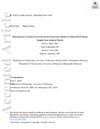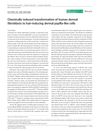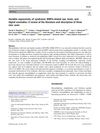 13 citations,
January 2020 in “Scientific Reports”
13 citations,
January 2020 in “Scientific Reports” The African spiny mouse heals skin without scarring due to different protein activity compared to the common house mouse, which heals with scarring.
 13 citations,
October 2013 in “The Journal of Dermatology”
13 citations,
October 2013 in “The Journal of Dermatology” Cepharanthine may help hair growth by increasing IGF-I in scalp cells.
 13 citations,
June 2007 in “Journal of Dermatological Science”
13 citations,
June 2007 in “Journal of Dermatological Science” Researchers created a cell line to study hair growth and found specific genes affected by dihydrotestosterone.
 12 citations,
March 2019 in “Journal of Cosmetic Dermatology”
12 citations,
March 2019 in “Journal of Cosmetic Dermatology” PRP injections improve hair thickness and density in hair loss, but more research needed.
 12 citations,
May 2017 in “Pharmacology & therapeutics”
12 citations,
May 2017 in “Pharmacology & therapeutics” Targeting immune tolerance issues in Alopecia Areata could restore hair growth and maintain remission.
 12 citations,
January 2016 in “Journal of Assisted Reproduction and Genetics”
12 citations,
January 2016 in “Journal of Assisted Reproduction and Genetics” Certain gene variations are linked to higher male hormone levels in Chinese women with PCOS and insulin resistance.
 12 citations,
April 2014 in “Molecular Medicine Reports”
12 citations,
April 2014 in “Molecular Medicine Reports” Targeting specific miRNAs may help treat hair follicle issues caused by hydrogen peroxide.
 11 citations,
March 2020 in “Immunology”
11 citations,
March 2020 in “Immunology” Human prenatal skin develops an immune network early on that helps with skin formation and healing without scarring.
 11 citations,
September 1999 in “Journal of the European Academy of Dermatology and Venereology”
11 citations,
September 1999 in “Journal of the European Academy of Dermatology and Venereology” Immunomodulatory therapies are effective for treating cutaneous lymphoma, particularly in early stages.
 10 citations,
September 2020 in “Archives of Dermatological Research”
10 citations,
September 2020 in “Archives of Dermatological Research” Both methods improve hair density and thickness; double-spin may be more effective.
 10 citations,
July 2011 in “British Journal of Dermatology”
10 citations,
July 2011 in “British Journal of Dermatology” Lower growth factors linked to balding in androgenetic alopecia.
 10 citations,
January 2012 in “International Journal of Trichology”
10 citations,
January 2012 in “International Journal of Trichology” PRP helps hair growth in common hair loss disorder.
 9 citations,
April 2019 in “International journal of molecular sciences”
9 citations,
April 2019 in “International journal of molecular sciences” Human hair grows better in a special gel that mimics skin.
 9 citations,
January 2017 in “Food & Nutrition Research”
9 citations,
January 2017 in “Food & Nutrition Research” Rice bran mineral extract may help promote hair growth and prevent hair loss.
 9 citations,
June 2014 in “European Journal of Obstetrics & Gynecology and Reproductive Biology”
9 citations,
June 2014 in “European Journal of Obstetrics & Gynecology and Reproductive Biology” Blood AMH levels are higher in women with PCOS than in those with other similar conditions.
 9 citations,
February 2005 in “The Journal of Men's Health & Gender”
9 citations,
February 2005 in “The Journal of Men's Health & Gender” Finasteride effectively treats male hair loss, increasing length and thickness.
 9 citations,
July 2011 in “Scientific Reports”
9 citations,
July 2011 in “Scientific Reports” Changes in the HR gene have influenced hair growth and may lead to hair loss conditions in humans.
 8 citations,
August 2020 in “Experimental dermatology”
8 citations,
August 2020 in “Experimental dermatology” PRP therapy for alopecia shows inconsistent results due to natural variability in growth factor secretion by platelets.
 8 citations,
January 2020 in “Skin Pharmacology and Physiology”
8 citations,
January 2020 in “Skin Pharmacology and Physiology” Caffeine improves hair growth, thickness, and reduces shedding.
 8 citations,
July 2019 in “Cell Proliferation”
8 citations,
July 2019 in “Cell Proliferation” Researchers found a way to turn skin cells into cells that can grow new hair.
 8 citations,
June 2019 in “Scientific Reports”
8 citations,
June 2019 in “Scientific Reports” Increased PPARGC1α relates to hair thinning in common baldness.
 8 citations,
April 2016 in “Anais Brasileiros De Dermatologia”
8 citations,
April 2016 in “Anais Brasileiros De Dermatologia” Right hand finger ratio may predict male hair loss.
 7 citations,
September 2020 in “Journal of Cosmetic Dermatology”
7 citations,
September 2020 in “Journal of Cosmetic Dermatology” Serum biomarkers like insulin-like growth factor-1 and vitamin D may help diagnose androgenetic alopecia.
 7 citations,
January 2020 in “Postepy Dermatologii I Alergologii”
7 citations,
January 2020 in “Postepy Dermatologii I Alergologii” Oxidative stress plays a role in female pattern baldness, causing an imbalance between harmful and protective elements in the body.
 7 citations,
May 2019 in “European Journal of Human Genetics”
7 citations,
May 2019 in “European Journal of Human Genetics” BMP4-related anomalies can cause a wide range of eye, brain, and hand/foot problems, and new cases show this variability.
 7 citations,
March 2019 in “Medicine”
7 citations,
March 2019 in “Medicine” Combining light therapy and microneedling shows promise for treating female hair loss.
 7 citations,
July 2018 in “Biological & Pharmaceutical Bulletin”
7 citations,
July 2018 in “Biological & Pharmaceutical Bulletin” Phyllanthus urinaria extract may help treat hair loss by blocking a hair-related enzyme.
 7 citations,
January 2017 in “Biological & Pharmaceutical Bulletin”
7 citations,
January 2017 in “Biological & Pharmaceutical Bulletin” Certain compounds from Panax ginseng can block proteins that affect hair growth, potentially helping treat hair loss.
 7 citations,
January 2015 in “Current problems in dermatology”
7 citations,
January 2015 in “Current problems in dermatology” Hair loss can be caused by stress, infections, drugs, and various diseases, with treatment depending on accurate diagnosis.
 7 citations,
July 2013 in “British Journal of Dermatology”
7 citations,
July 2013 in “British Journal of Dermatology” No genetic link between prostaglandins and hair loss found.





























